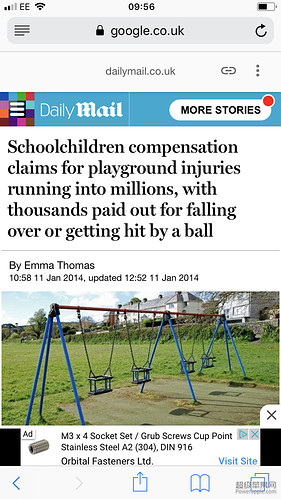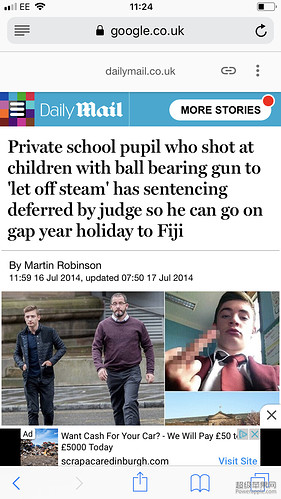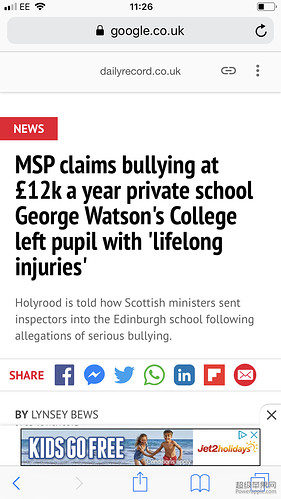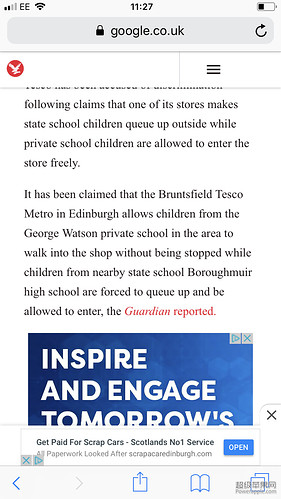For anyone unable to access today’s original Sunday Times article, I append it here. It’s a harrowing read…
FYI the accompanying news piece says that more than two dozen other victims have now come forward. Looks like this one may run and run.
CJ Sansom: Ten years at George Watson’s College nearly killed me. Half a century on, I fear it’s still a bullies’ playground
Reports of bullying allegedly tolerated by a top Edinburgh school have reawoken terrifying memories for one former pupil, CJ Sansom, author of the bestselling, Tudor-set Shardlake novels. Now terminally ill, he begs parents: please, don’t let your own child suffer
One reviewer of my latest novel commented that “atmospheres of oppression and wariness, in which careless words . . . can be fatal” seem to engross me. That is true, and this article is about why. Last December I watched the Netflix drama The Crown. One episode portrayed the bullying of Prince Charles at Gordonstoun in the 1960s. It shook me deeply, for it brought back my terrible years as a pupil at George Watson’s College, an Edinburgh private day school, which scarred me for life and nearly resulted in my death by suicide at 15.
I googled Watson’s and found a slew of press articles about a recent bullying investigation at the school. The allegations concerned a girl, Kate — though of course that is not her real name — who from the start of her time as a primary school pupil at Watson’s was incessantly hit, mocked and excluded from play. She is said to have stayed within touching distance of the playground wall, and took refuge in the lavatories, where a group of girls switched the lights off so it was pitch black. Her parents said they met with a “culture of denial” from the school that let the bullying continue. In the end they took her away.
Reading these articles, I found myself shaking uncontrollably. So many of Kate’s alleged experiences — the mocking, the exclusion, the taking refuge in the lavatories, even the standing against the wall — mirrored to the last detail my recollections of my own experiences at Watson’s half a century ago.
I was there for 10 years, mocked and isolated by the other children while the teachers blamed this on me and sometimes collaborated in it. I spent my whole time in the bottom form. All my life I have had the feelings of worthlessness, inferiority and self-blame characteristic of abused children.
I have wanted to write about this for years, and the determination of Kate’s parents to expose what happened to her, with the help of their MSP, Andy Wightman, has finally led me to realise fully that I was not the only one; that what happened was not my fault. They gave me the courage to go public, and I thank them.
But coupled with this is my profound worry that — half a century later — the same things may be happening at Watson’s as happened to me, while the school is said to have denied it has problems and blamed the victim. The headmaster, Melvyn Roffe, claimed Kate was “having problems making friends”, just what my primary school teachers used to tell my parents. And my story and Kate’s are not the only ones of bullying at a school that charges fees of up to £11,900 a year and has 2,364 pupils, aged 3-18. To me it seems Watson’s is concerned to protect its reputation, not the victims of abuse — an approach with a long and lamentable history in certain educational institutions.
To go back in time: when I entered the (then single-sex) primary school in 1957, pupils seemed to be divided between the academically bright and well behaved, who got most attention, the mass in the middle including the less bright (or those categorised as such) and those who were in some way “different” or “disobedient”. There is a Japanese proverb that the nail that sticks out gets hammered down, and that was the Watson’s approach: more boot camp than school, in my experience, unless you were academically bright or good at rugby. Those who misbehaved or did badly in class were a nuisance and left to the bullies.
Of course, the bullying of a minority of children, usually by a minority, happens at all schools. Children are not angels. But it is the responsibility of any school to seek actively to prevent it.
Watson’s, then as now, was prestigious, very much part of the Edinburgh establishment. At morning assembly we were told how privileged we were to be there. Watson’s teachers were the “high heid yins”, unchallengeable by parents even when they were told, as mine were by the head of the primary school, that their child deserved to be “put at the back of the class and forgotten”.
Like most children targeted by bullies, when I went to Watson’s at the age of four I was already “odd”. From birth I was noisy and uncontrollable, a trial and a puzzle to my parents. Starting at Watson’s, I was totally at sea in this vast place full of regimented lines of little children being led to and fro and given instructions that I could not take in, let alone follow. I remember asking a teacher what room I was supposed to be in, and his curt, snappy reply, angry about my inattention. And when my puzzlement at what I was supposed to be doing turned to tears, I was done for. Tears attract bullies as jam attracts wasps.
For years my school reports were full of my inattention: the failure to concentrate or take my work seriously. I remember the primary school head as a foul-tempered, vicious man, and I was one of his bêtes noires. Yet I didn’t steal, or vandalise school property, or hurt anybody. I just couldn’t get it together.
I think now, having recently taken the standard medical test, I probably had ADHD. As is common, the symptoms disappeared in my teens. Indeed my mother cottoned on to this years later when she read a book, The Hyperactive Child, and said it described me as a child exactly.
Of course, one would not expect teachers in the 1960s to know what ADHD was, but they might at least have considered there might be some other reason for my behaviour than just being “bad”. And their apparent collaboration in the bullying was unforgivable.
As with Kate’s account, it began almost immediately: I vividly remember crying, surrounded by a circle of jeering boys. Like her, I hid in the lavatories, but the boys followed me in and continued tormenting me, putting their heads over the top and under the bottom of the cubicle until the janitor, a brutal retired regimental sergeant-major, came in to find out what the noise was, and shouted at me for causing the trouble. (Where were the playground supervision staff, if any, while Kate’s bullying was going on?)
Bullies always need a tag to hang on their victims. I was tall for my age, but skinny, so they used my name. I was the opposite of the strong Samson of the Bible: weak, skinny Sansom. This tag haunted me all through my schooldays.
Mostly, I managed to avoid physical violence, though the threat was always near. I learnt I must not cry. At lunchtime and breaks I hid in empty classrooms and, later on, in a cavity inside a pile of unused chairs covered with a fire curtain in the assembly hall. It was dangerous, but I was past caring.
I did have friends from time to time, though my endless talking would drive them away. And always, underneath, was the sense of inferiority, difference, shame. Poor reports and complaints from school caused problems with my parents: thus Watson’s bled into my home life.
Yet even then I had other, conflicting feelings — a burning sense of injustice and anger. Why had I been singled out? What had I done that was so wicked and wrong? I think my rage kept me from falling completely apart.
Is it correct to call this abuse? I suffered no sexual and little physical violence — but constant emotional abuse can also permanently affect the victim. All my life I have found it impossible to trust others, or to allow them to get close to me. I was not the only one to suffer in this way — I remember two other boys in my year also being targeted, partly because they cried.
One might also ask, given the terrible lives of deprived children today — poverty, violence, gangs — why anyone should be concerned about privileged private school pupils. My answer is: all are children. And private schools, where powers of inspection are very limited, can in many ways behave as they like.
CJ Sansom in school uniform: he started at George Watson’s aged five CJ Sansom in school uniform: he started at George Watson’s aged five ANDREW HASSON Some teachers, usually the younger ones, were decent people, looking on me with puzzlement rather than scorn. Others, though, would mock me themselves, knowing it would get a laugh from the boys. One teacher, I remember, got a laugh by describing me as sitting staring into space like a “contented cow”.
In 1963, aged 10, I moved into the class of a fierce disciplinarian who on the first day picked me and another boy out, said we were known for misbehaviour and sat us at the front of the classroom, where he could keep an eye on us. In my experience Watson’s was expert at giving a dog a bad name and hanging him.
And so on to secondary school. My performance was so bad that my parents took me to a psychiatrist to find out whether I was “mentally deficient”. They were dumbfounded when a test revealed my IQ to be not unusually low, but unusually high. I then underwent psychotherapy. I remember little about it, but it was no use. There was no way I could reveal my feelings of vulnerability, anger and hatred, feelings so unbearable I had begun dissociating from them, forgetting Watson’s the moment I stepped outside, increasingly living in an escapist world of books, films and television.
It was suggested I try to become less unpopular by joining in school activities. Watson’s second obsession after academic success was rugby, and though I had always been hopeless and uncoordinated at PE, I went along to join the after-school practice. The boys in the changing room greeted my arrival with gales of laughter: “Sansom’s come!” I turned round and walked out.
Rugby was no loss. Other things were. The one sport I immediately took to was swimming, but the teacher put me, with a few others he had been told were duds, in the shallow end and told us to stay there, splashing about while the rest of the boys were taught the strokes. Years later I did learn swimming and enjoyed it for many years. The pleasure of it in childhood, as with so much else, was stolen by my experience at Watson’s. The same went for music: I asked about joining the choir but was turned down flat, never even allowed to a practice. It was years before I could listen to classical music — now it is one of the pleasures of life, but again it was stolen for years.
By the time I was 14, I was, I now realise, becoming seriously mentally ill: completely isolated, hardly aware of what was being said in the classroom, consumed with rage, plagued by migraines and tormented by thoughts of suicide and burning down the school. There were some compassionate teachers; but, though they tried to help, I was beyond their intervention. The bullying now consisted mainly of people shouting “spastic” or other insults down the corridor, or just shouting out my name and laughing.
Then I turned 15, at that time the school leaving age. Realising I could not legally be forced to return, I walked out of Watson’s and refused to go back.
But the damage was done. Shortly afterwards I took a massive overdose of my mother’s sleeping pills; I was found only just in time. Both my parents were profoundly shocked and, for the first time, realised how ill I was.
There followed a year as an inpatient at a mental hospital. There, for the first time in my life, I was not treated as a pariah, and I owe more than I can say to the devotedly caring staff. They saved my life, just as I feel my time at Watson’s nearly destroyed it. My mind came to life and I found interests in literature, history and politics; I began, if clumsily, to develop social skills. But still I could not bear to talk about my school experiences.
I went to college and did O and A-levels, and then a history BA and PhD; I later retrained as a solicitor (now retired) and became a novelist. I left Watson’s with no qualifications whatever; all the money my father paid in fees might as well have been stuffed down the nearest drain.
It may seem a tenuous line between what happened to me in the Fifties and Sixties and the alleged mistreatment of Kate in the 2010s. But we are not alone. In 2010 a 14-year-old Watson’s pupil, saying he was the victim of relentless bullying, threatened online to shoot the three worst bullies and then himself. The police came; there was no gun, but there was obviously a serious problem; Watson’s had no comment.
After Kate’s case was reported, Wightman, the MSP, revealed he had received “many emails and phone calls from parents and former pupils informing me of very serious problems”. Watson’s first reaction was not to follow up these matters with him but to denigrate him.
What fuels my fear that there may be embedded, institutional bullying at Watson’s is the response of the school. After a complaint by Kate’s parents and an official inspection, the Registrar of Independent Schools reviewed the case and said: “The Scottish ministers are satisfied that George Watson’s College is at risk of becoming objectionable on the following ground: that the welfare of a pupil attending the school is not adequately safeguarded and promoted there. Accordingly, the Scottish ministers are satisfied that it is necessary . . . to impose conditions on the running of George Watson’s College.”
The conditions included the implementation of a new complaints handling policy, and a report on how the governing council “provides the scrutiny and challenge to school policy and practice required to deliver continued improvement”. The school has responded that the conditions related not to bullying or child safeguarding but to governance. In March the Scottish government removed the conditions, even though one may not by then have been fully met.
Independent schools in Scotland are not subject to regular inspections, unlike state schools. I have said that in my time I saw others suffer prolonged bullying. The school’s initial reaction to Kate’s experiences and to the subsequent review appals me.
It took many years for me to speak out publicly, and I wonder how many others are out there, suffering silently. I hope they too may find the courage, which heaven knows is not easy, to break their silence. Doing so has given me a new sense of freedom — late in life, but still worth having. I wish I could do more myself, but I have incurable cancer, which prevents that. Should evidence emerge that victimisation of the “different” is institutionally embedded at Watson’s, I hope others will pick up the torch.
Kate’s mother said in an interview that “sometimes you hear of parents who have a child die and spend the rest of their own lives campaigning. I feel so grateful our daughter is alive — we got her out in time.” This is not hyperbole — I came within an inch of death myself, and Kate has allegedly suffered lifelong injuries. Based on my experience, this is my advice to any parent whose child is in any way distinct, or different, or individual: think very carefully about your choice of school.
And to parents generally, I would say that bullying, especially prolonged bullying, can have terrible consequences. Please, please, be on your guard.
2 Comments14
DuskytheHusky • May 7, 2018, 1:05 AM
I went to a private school too, and there was some bullying there - similar to what is in the press about GW too. It’s a bizarre environment to go into, being from outside the private school system, and it took me a year or two to bed myself in; I can totally see how people get isolated and picked on, in hindsight.
The reports coming out of GW are terrible, but it does seem to be in the complete minority, and there is no way that something bad enough to make the press isn’t being worked on by the school internally, as well as by the government. The worst thing that could happen to a fee paying school is for people to not want to send their kids there - they survive almost entirely on the revenue, charity status aside.
I can’t help but think that, like the author said, the link between his experience in the 50s and what’s happening now is tenuous, linked only by being at the same school. Private schools back then were vastly different to what they’re like now, and horror stories back then were abound.
Anecdotally, I’ve a fair number of friends and colleagues that send their kids to GW, and they had no idea anything was going on until it was reported in the press… Let’s hope they sort it out soon; who knows, perhaps with a new school year starting next year, some of the people involved will no longer attend?
4
anedinburghman • May 9, 2018, 3:44 AM
it is of no matter if it is a minority issue (can bullying realistically be anything else, except where the staff are wholesale complicit/incompetent?); the issue is that repeatedly, throughout different establishments (schools/care homes/wherever), insiders and outsiders (including auditors etc) brush off not just anecdotal and specific incidents, but evidence of institutional errors, tolerance or denial of systemic issues, neglecting their duty of care and their (normally) stated policy of zero tolerence to such issues.
I don’t consider myself a severe victim of bullying but I share many of the experiences and feelings above so I feel I have a voice in this.





